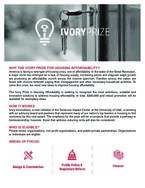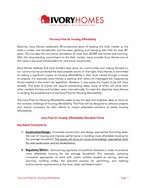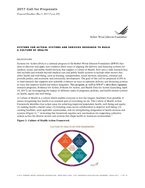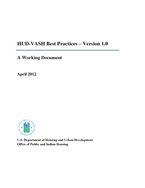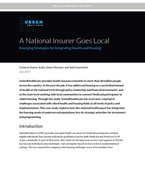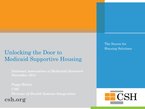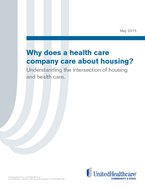0
Policy Brief
Community:
This short document provides basic information to help housing and homeless assistance providers advocate with their families and youth for appropriate educational services, from birth through higher education. The rights and protections outlined here apply to all children and youth experiencing homelessness, as defined by the education subtitle of the McKinney-Vento Act.
Authored by: SchoolHouse Connection
Topics: Disabilities, Dual-generation, Early childhood, Education, Family engagement, Homelessness, Housing, Legislation & Policy, Low-income, Post-secondary, Youth
 Shared by Mica O'Brien
Shared by Mica O'Brien
Mica O'Brien posted a
on Oct 10, 2018
This short document provides basic information to help housing and homeless assistance providers advocate with their families and youth for appropriate educational services, from birth through higher education.
0
Interactive
Community:
Aug 20, 2018
Enhance your knowledge around family homelessness and the McKinney-Vento Homelessness Assistance Act's definition of "homeless" as it refers to children and youth. Review other relevant federal regulations for Head Start, Early Head Start, and Child Care and Development Fund (CCDF)-subsidized programs.
This interactive learning series is intended for professionals in Head Start, Early Head Start, and child care, including early childhood and school-age child care providers, CCDF Lead Agency or designated entity staff, and other key stakeholders. Learn how to identify families experiencing homelessness, conduct community outreach, and much more.
Authored by: U.S. Department of Health and Human Services, Administration for Children and Families
Topics: Child welfare, Early childhood, Education, Family engagement, Grade-level proficiency, Homelessness, Housing, Low-income, Stability
 Shared by Mica O'Brien
Shared by Mica O'Brien
Mica O'Brien posted a
on Oct 10, 2018
U.S. Department of Health and Human Services, Administration for Children and Families
Enhance your knowledge around family homelessness and the McKinney-Vento Homelessness Assistance Act's definition of "homeless" as it refers to children and youth.
0
Research
Community:
Oct 1, 2018
Although the rental assistance programs varied, key themes emerged, including (1) most programs, recognizing the impact of housing stability on health outcomes, targeted populations served by state or local health and human services programs; (2) most programs served a growing number of households over time; (3) funding generally increased over time and most of it came from general revenue; and (4) programs involved collaboration between the housing and health and human services agencies to ensure clients’ needs were comprehensively met.
Authored by: Anna Bailey, Peggy Bailey, and Douglas Rice for the Center on Budget and Policy Priorities
Topics: Funding, Health, Housing, Legislation & Policy, Low-income, Partnerships, Place-based, Research, Stability
 Shared by Mica O'Brien
Shared by Mica O'Brien
Mica O'Brien posted a
on Oct 9, 2018
Anna Bailey, Peggy Bailey, and Douglas Rice for the Center on Budget and Policy Priorities
Although the rental assistance programs varied, key themes emerged, including (1) most programs, recognizing the impact of housing stability on health outcomes, targeted populations served by state or local health and human services programs; (2) most programs served a growing number of households o
0
News Article
Community:
Oct 3, 2018
For years, Dallas has poured millions of federal dollars into affordable housing, to little effect. But in May, the City Council unanimously passed a new comprehensive housing policy, a first for the city. The goal is to build 20,000 new homes — but only in select, pre-approved neighborhoods deemed ripe for revitalization.
Authored by: Teresa Wiltz for Stateline
Topics: Community development, Housing, Legislation & Policy, Low-income, Mobility, Racial inequalities, South
 Shared by Mica O'Brien
Shared by Mica O'Brien
Mica O'Brien posted a
on Oct 4, 2018
Teresa Wiltz for Stateline
For years, Dallas has poured millions of federal dollars into affordable housing, to little effect. But in May, the City Council unanimously passed a new comprehensive housing policy, a first for the city.
0
Research
Community:
Oct 3, 2018
Using administrative data from Massachusetts, this study analyzes the health care use and Medicaid expenditures of families who experienced one or more homeless episodes between 2008 and 2015 to investigate how health care use is related to emergency housing experiences.
Authored by: Urban Institute
Topics: Asthma, Child welfare, Depression, Health, Homelessness, Housing, Low-income, Medicaid / Medicare, Metrics, Pre-natal, Research
 Shared by Mica O'Brien
Shared by Mica O'Brien
Mica O'Brien posted a
on Oct 4, 2018
Using administrative data from Massachusetts, this study analyzes the health care use and Medicaid expenditures of families who experienced one or more homeless episodes between 2008 and 2015 to investigate how health care use is related to emergency housing experiences.
0
Research
Community:
Oct 4, 2018
Housing providers and counselors in urban, suburban, and rural areas can help refugees and resettlement agencies navigate challenging rental markets, understand the evidence about how housing and neighborhoods matter, and prepare for long-term success as a renter or owner.
Authored by: Brianne Casey, Kimberly Burrowes, and Maya Brennan for Urban Institute
Topics: Community development, Housing, Immigrants, Research, Stability
 Shared by Mica O'Brien
Shared by Mica O'Brien
Mica O'Brien posted a
on Oct 4, 2018
Brianne Casey, Kimberly Burrowes, and Maya Brennan for Urban Institute
Housing providers and counselors in urban, suburban, and rural areas can help refugees and resettlement agencies navigate challenging rental markets, understand the evidence about how housing and neighborhoods matter, and prepare for long-term success as a renter or owner.
0
News Article
Community:
Sep 27, 2018
Nationally, resources for providing families with housing assistance are inadequate. DC is piloting a new approach, the DC Flexible Rent Subsidy Program (DC Flex), to test whether shallow (smaller than the average subsidy, over a defined period) and flexible subsidies can help more families maintain affordable, adequate housing.
Authored by: Mychal Cohen and Josh Leopold for Urban Institute
Topics: Cost effectiveness, East Coast, Housing, Low-income, Research, Stability
 Shared by Mica O'Brien
Shared by Mica O'Brien
Mica O'Brien posted a
on Oct 4, 2018
Mychal Cohen and Josh Leopold for Urban Institute
Nationally, resources for providing families with housing assistance are inadequate.
0
News Article
Community:
Oct 1, 2018
Some places lift children out of poverty. Others trap them there. Now cities are trying to do something about the difference.
Authored by: Emily Badger and Quoctrung Bui for The New York Times
Topics: Child welfare, CLPHA, Community development, Criminal justice, Housing, Low-income, Metrics, Mobility, Racial inequalities, Research, Stability, Youth
 Shared by Mica O'Brien
Shared by Mica O'Brien
Mica O'Brien posted a
on Oct 1, 2018
Emily Badger and Quoctrung Bui for The New York Times
Some places lift children out of poverty. Others trap them there. Now cities are trying to do something about the difference.
1
Publication
Community:
May 25, 2017
Neighborhoods are constantly changing as residents come and go, businesses open and close, and properties go up or come down. No place is the same for long. When community changes are widespread or stark, the conversation shifts from change to “gentrification,” the definition of which is often subject to debate. At its heart, gentrification happens when a low-income area that has experienced disinvestment attracts new economic investments and higher-income residents. But the benefits of these changes can be overshadowed by the perpetuation of disadvantage.
Authored by: How Housing Matters for The Urban Institute
Topics: Community development, Housing, Low-income, Mobility, Racial inequalities
 Shared by Mica O'Brien
Shared by Mica O'Brien
Mica O'Brien posted a
on Sep 27, 2018
How Housing Matters for The Urban Institute
Neighborhoods are constantly changing as residents come and go, businesses open and close, and properties go up or come down. No place is the same for long.
0
News Article
Community:
Sep 22, 2018
For the Omaha refugee families removed from an apartment complex where city inspectors found gas leaks, vermin and other code violations, there were glimmers of progress Friday amid the uncertainty.
Authored by: Erin Duffy for the Omaha World Herald
Topics: Health, Housing, Immigrants, Low-income, Midwest, Safety
 Shared by Mica O'Brien
Shared by Mica O'Brien
Mica O'Brien posted a
on Sep 27, 2018
Erin Duffy for the Omaha World Herald
For the Omaha refugee families removed from an apartment complex where city inspectors found gas leaks, vermin and other code violations, there were glimmers of progress Friday amid the uncertainty.
0
News Article
Community:
Sep 21, 2018
A children’s hospital in Columbus, Ohio, is trying to treat a difficult patient: Its own struggling neighborhood.
Authored by: Laura Bliss for CityLab
Topics: Affordable Care Act, Child welfare, Health, Housing, Low-income, Midwest, Partnerships
 Shared by Mica O'Brien
Shared by Mica O'Brien
Mica O'Brien posted a
on Sep 25, 2018
A children’s hospital in Columbus, Ohio, is trying to treat a difficult patient: Its own struggling neighborhood.
1
Research
Community:
Sep 19, 2018
About 20 percent of adults in sheltered homeless families have a disability, compared with 9 percent of all US adults, yet few studies have addressed the intersection of disability and housing instability. A recent study explored the relationship between disabilities and Supplemental Security Income (SSI)/Social Security Disability Insurance (SSDI) income that homeless families reported when they entered emergency shelters, as well as later outcomes, such as housing stability, self-sufficiency, and food insecurity. It also examined how housing interventions affect SSI/SSDI income receipt.
Authored by: Urban Institute
Topics: Disabilities, Homelessness, Housing, Low-income, Research, Stability
 Shared by Mica O'Brien
Shared by Mica O'Brien
Mica O'Brien posted a
on Sep 20, 2018
About 20 percent of adults in sheltered homeless families have a disability, compared with 9 percent of all US adults, yet few studies have addressed the intersection of disability and housing instability.
0
Research
Community:
Sep 19, 2018
Many social issues stem from a history of unstable, unaffordable, and poor-quality housing. Research shows that housing is the first rung on the ladder to economic opportunity for individuals and that a person’s access to opportunity is intrinsically linked with that of the community at large. As the gap between rents and incomes widens, it is critical that professionals in fields outside housing—including health, education, and economic development, among others—understand its central importance.
Authored by: Veronica Gaitan for Urban Institute
Topics: Community development, Education, Health, Housing, Low-income, Metrics, Partnerships, Research
 Shared by Mica O'Brien
Shared by Mica O'Brien
Mica O'Brien posted a
on Sep 20, 2018
Veronica Gaitan for Urban Institute
Many social issues stem from a history of unstable, unaffordable, and poor-quality housing. Research shows that housing is the first rung on the ladder to economic opportunity for individuals and that a person’s access to opportunity is intrinsically linked with that of the community at large.
1
Interactive
Community:
Sep 18, 2018
HOW IT WORKS
Ivory Innovations, a new initiative of the Sorenson Impact Center at the University of Utah, is working with an advisory board and partners that represent many of our nation’s top leaders in housing to find nominees for this new award. The emphasis for the prize will be on projects that provide a pathway to homeownership; however, those that address reducing rents will also be considered.
WHO IS ELIGIBLE?
Private-sector organizations, non-profit organizations, and public-private partnerships. Organizations or individuals are eligible.
Authored by:
Topics: Funding, Housing, Stability
 Shared by Mica O'Brien
Shared by Mica O'Brien
Mica O'Brien posted a
on Sep 18, 2018
HOW IT WORKS
Ivory Innovations, a new initiative of the Sorenson Impact Center at the University of Utah, is working with an advisory board and partners that represent many of our nation’s top leaders in housing to find nominees for this new award.
0
Interactive
Community:
Sep 18, 2018
The Ivory Prize for Housing Affordability seeks to tap the best and brightest ideas to focus on the complex challenge of housing affordability. The Prize will be designed to advance projects and reward innovators for their efforts to impact adoptable solutions to tackle housing affordability.
Authored by:
Topics: Funding, Housing, Stability
 Shared by Mica O'Brien
Shared by Mica O'Brien
Mica O'Brien posted a
on Sep 18, 2018
The Ivory Prize for Housing Affordability seeks to tap the best and brightest ideas to focus on the complex challenge of housing affordability. The Prize will be designed to advance projects and reward innovators for their efforts to impact adoptable solutions to tackle housing affordability.
0
News Article
Community:
Sep 11, 2018
Harvey — and its record rains — is long gone. But life may never be the same for thousands of children who spent the past school year — and will spend the one that just began — without a home. Their schools have been rebuilt. Their lives have not.
Authored by: Kristine Phillips for The Washington Post
Topics: Child welfare, Education, Homelessness, Housing, Low-income
 Shared by Mica O'Brien
Shared by Mica O'Brien
Mica O'Brien posted a
on Sep 18, 2018
Kristine Phillips for The Washington Post
Harvey — and its record rains — is long gone. But life may never be the same for thousands of children who spent the past school year — and will spend the one that just began — without a home. Their schools have been rebuilt. Their lives have not.
0
News Article
Community:
Sep 12, 2018
As the devastating effects of the opioid crisis continue, a growing body of research supports the efficacy and safety of this sort of medication-assisted treatment (also called MAT) for drug recovery, when combined with psychotherapy. But the use of any of these medicines — a list that includes methadone and naltrexone, as well as Suboxone — remains frowned upon by most operators of sober living houses.
Authored by: Nina Feldman for NPR
Topics: Health, Housing, Substance abuse
 Shared by Mica O'Brien
Shared by Mica O'Brien
Mica O'Brien posted a
on Sep 18, 2018
As the devastating effects of the opioid crisis continue, a growing body of research supports the efficacy and safety of this sort of medication-assisted treatment (also called MAT) for drug recovery, when combined with psychotherapy.
0
Research
Community:
Jul 1, 2018
This report compares the profile of the schools accessible to HUD-assisted and LIHTC households in 2016 to the profile of those accessible to other similar households within the same state or metropolitan area. In brief, we find that families receiving all four major types of federal housing assistance lived near lower performing and higher poverty schools than other poor families with children as well as other renters with children.
Authored by: Poverty and Race Research Action Council, NYU Furman Center, and UMass Boston
Topics: Education, Housing, Low-income, Mobility, Racial inequalities, Research, Youth
 Shared by Mica O'Brien
Shared by Mica O'Brien
Mica O'Brien posted a
on Sep 18, 2018
Poverty and Race Research Action Council, NYU Furman Center, and UMass Boston
This report compares the profile of the schools accessible to HUD-assisted and LIHTC households in 2016 to the profile of those accessible to other similar households within the same state or metropolitan area.
0
Case study
Community:
Jun 25, 2018
The King County Housing Authority (KCHA), in partnership with the Highline School District and the nonprofit social service organization Neighborhood House, launched the Student and Family Stability Initiative (SFSI) pilot program in 2013 to provide housing and employment supports to homeless and unstably housed families with children enrolled in Highline elementary schools. In 2016, KCHA contracted with the Urban Institute (Urban) to conduct a process and outcome evaluation of the program’s first three pilot years. This evaluation documents how SFSI works, who it serves, and how well it helps participants achieve housing stability. This report synthesizes findings from data collection conducted over approximately 10 months that included document review, interviews with SFSI stakeholders, and analysis of program and other relevant KCHA administrative data.
Authored by: Martha M. Galvez, Amanda Gold, and Sara McTarnaghan
Topics: Attendance, Dual-generation, Education, Family engagement, Housing, Low-income, Pacific Northwest, Partnerships, Place-based, Research, Stability, Workforce development, Youth
 Shared by Mica O'Brien
Shared by Mica O'Brien
Mica O'Brien posted a
on Sep 18, 2018
Martha M. Galvez, Amanda Gold, and Sara McTarnaghan
The King County Housing Authority (KCHA), in partnership with the Highline School District and the nonprofit social service organization Neighborhood House, launched the Student and Family Stability Initiative (SFSI) pilot program in 2013 to provide housing and employment supports to homeless and un
1
News Article
Community:
Aug 19, 2018
A body of evidence points to a link between living in areas of concentrated poverty and health.
Authored by: Paul Chisholm for NPR
Topics: Child welfare, Community development, Health, Housing, Low-income, Medicaid / Medicare, Metrics, Partnerships, Racial inequalities, Safety
 Shared by Housing Is
Shared by Housing Is
Housing Is posted a
on Aug 20, 2018
A body of evidence points to a link between living in areas of concentrated poverty and health.
0
Publication
Community:
Aug 9, 2018
Systems for Action (S4A) is a national program of the Robert Wood Johnson Foundation (RWJF) that aims to discover and apply new evidence about ways of aligning the delivery and financing systems for medical, social, and public health services that support a Culture of Health. This program, as well as RWJF’s other three signature research programs, Evidence for Action, Policies for Action, and Health Data for Action (launching April 19, 2017), are investigating the impact of different types of programs, policies, and health-related systems on health, equity and well-being.
Authored by:
Topics: Funding, Health, Housing, Partnerships, Research
 Shared by Housing Is
Shared by Housing Is
Housing Is posted a
on Aug 9, 2018
Systems for Action (S4A) is a national program of the Robert Wood Johnson Foundation (RWJF) that aims to discover and apply new evidence about ways of aligning the delivery and financing systems for medical, social, and public health services that support a Culture of Health.
0
Report
Community:
Aug 9, 2018
In the fall of 2011, a request for the submission of best practices was sent to public housing agencies (PHAs) and VA Medical Centers (VAMCs) that administer the program via the HUDVASH listserv. Over 50 best practices accounts were submitted in response to the request. The practices below have been compiled based on these accounts, which were cross-referenced with monthly data on agency performance and further developed through phone interviews.
Authored by:
Topics: Health, Housing, Partnerships
 Shared by Housing Is
Shared by Housing Is
Housing Is posted a
on Aug 9, 2018
In the fall of 2011, a request for the submission of best practices was sent to public housing agencies (PHAs) and VA Medical Centers (VAMCs) that administer the program via the HUDVASH listserv. Over 50 best practices accounts were submitted in response to the request.
0
Report
Community:
Aug 9, 2018
UnitedHealthcare provides health insurance benefits to more than 40 million people across the country. In the past decade, it has addressed housing as a social determinant of health at the national level through policy leadership and financial investments, and at the state level working with local communities to connect Medicaid participants to stable housing. Through this work, UnitedHealthcare has overcome a myriad of challenges associated with siloed health and housing fields at all levels of policy and implementation. This case study explores how this national health payer has integrated the housing needs of underserved populations into its strategic priorities for investment and programming.
Authored by:
Topics: Affordable Care Act, Data sharing, Funding, Health, Homelessness, Housing, Low-income, Medicaid / Medicare, Partnerships
 Shared by Housing Is
Shared by Housing Is
Housing Is posted a
on Aug 9, 2018
UnitedHealthcare provides health insurance benefits to more than 40 million people across the country.
0
Publication
Community:
Aug 9, 2018
Introduction to supportive housing and notes from the field
Authored by:
Topics: Health, Housing, Low-income, Medicaid / Medicare, Mental health, Partnerships, Supportive housing
 Shared by Housing Is
Shared by Housing Is
Housing Is posted a
on Aug 9, 2018
Introduction to supportive housing and notes from the field
0
Policy Brief
Community:
Aug 9, 2018
In a post health care reform era, Medicaid programs need to build system capacity to effectively manage increasingly complex Medicaid populations while simultaneously seeking innovative solutions to reduce costs and improve access. As states are increasingly becoming more reliant upon managed care for complex populations – such as individuals in need of long-term services and supports, those with intellectual or developmental disabilities, individuals with severe and persistent mental illness, as well as children with special health care needs – the needs of these populations range far beyond traditional health care.
Authored by:
Topics: Funding, Health, Housing, Low-income, Medicaid / Medicare, Partnerships
 Shared by Housing Is
Shared by Housing Is
Housing Is posted a
on Aug 9, 2018
In a post health care reform era, Medicaid programs need to build system capacity to effectively manage increasingly complex Medicaid populations while simultaneously seeking innovative solutions to reduce costs and improve access.








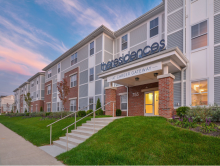
 Shared by Housing Is
on Aug 20, 2018
Shared by Housing Is
on Aug 20, 2018

 Shared by Housing Is
on Aug 9, 2018
Shared by Housing Is
on Aug 9, 2018
 Shared by Housing Is
on Aug 9, 2018
Shared by Housing Is
on Aug 9, 2018
 Shared by Housing Is
on Aug 9, 2018
Shared by Housing Is
on Aug 9, 2018
 Shared by Housing Is
on Aug 9, 2018
Shared by Housing Is
on Aug 9, 2018
 Shared by Housing Is
on Aug 9, 2018
Shared by Housing Is
on Aug 9, 2018




